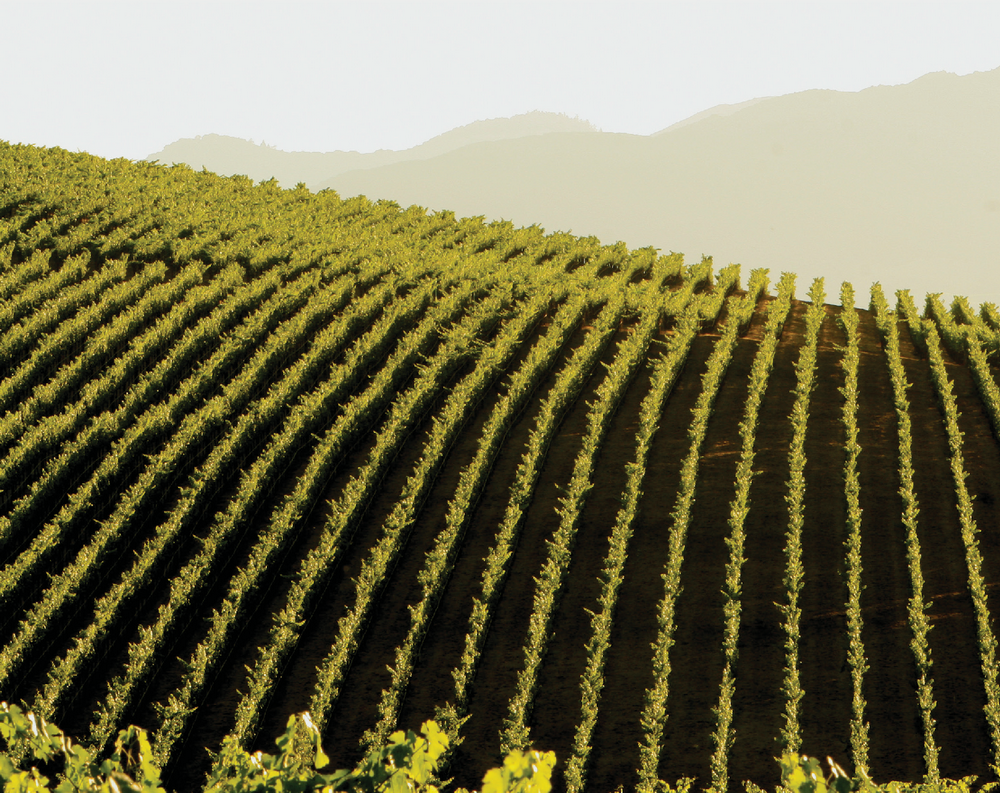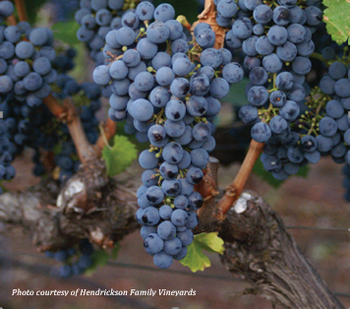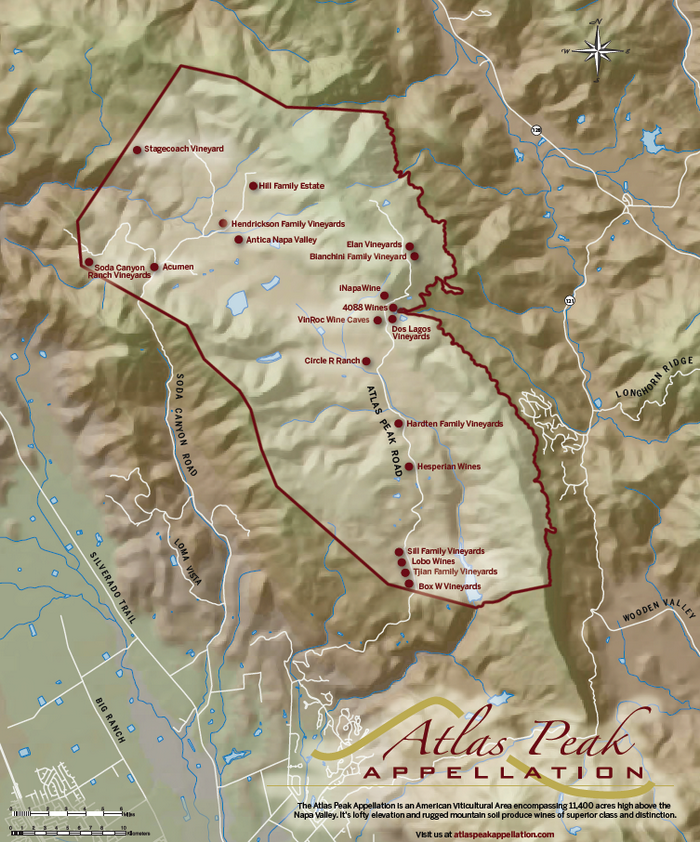Napa Varietal Series + SIP
Atlas Peak AVA
Published On: January 20, 2020

Discernibly Different: Atlas Peak AVA
Ask any Atlas Peak grape grower, and he/she will attest to the difficulty in cultivating fruit within this highly elevated, rugged, and visually stunning landscape. But each vintner will also wax rhapsodically about the exquisite wines that result from the unique terrior.
Located at 2,663 feet on the western slopes of the Vaca Range that separates the Napa and Sacramento valleys, Atlas Peak is known for its volcanic soils and its pure, clean, fresh, high altitude air that is cleansed by San Francisco Bay breezes. Those breezes, combined with the micronutrients derived from the volcanic soil, produce acclaimed wines known for their intense flavors and delicate, balanced tannins – wines that are considerably different from those produced within the valley floor.
Though volcanic soils account for a mere 1% of the world’s surface, they contribute a much larger percent- age of the world’s truly great vineyards. Within Napa, for instance, many of the valley’s acclaimed ‘cult’ wines are derived from high elevation volcanic vineyards such as those atop Atlas Peak. Vineyard developer William (Bill) Hill long ago understood the wine quality potential of Atlas Peak, leading him to develop what became the Antinori Estate and the Circle R Ranch. When Hill created Prime Solum in 2006 to produce single-vineyard Cabernet, naturally he included Atlas Peak as a source.
“Perched above the fog line, Atlas Peak is blessed by the cool after- noon breezes that hit the southeast slopes of the mountain,” said Hill.
“This provides ideal conditions for longer hang times and the gradual development of phenolic ripeness – the components that make these wines some of the most intense and balanced in Napa Valley.”
First recognized as an AVA in 1992, Atlas Peak has been producing wines of renown since 1870 when vineyards were first planted in the area. Varietals at the time included Chasselas, Malvoisie, Burgundy, Muscat, Flaming Tokay, Mission, Riesling, and Zinfandel – for which the region was perhaps best known. Today, the AVA produces premium varietals used to create Bordeaux-style wines, such as Cabernet Sauvignon, Cabernet Franc, Petit Verdot, Malbec, and Merlot. Grapes grown in the region also include Syrah, Marsanne, Sangiovese, Chardonnay, and Sauvignon Blanc. Atlas Peak growers supply fruit to dozens of wineries in Napa and Sonoma counties, helping to create some of the finest wines in the world. In addition, local vintners and winemakers produce, bottle, and market their own brands. And since its inception as a recognized AVA, producers now feature the Atlas Peak designation on their labels to help consumers recognize the regional characteristics and distinct style of Atlas Peak appellation wines.

“Volcanic wines tend to be produced in small quantities from land that is extremely difficult to plant and farm,” said Igor Sill, Court of Master Sommelier and proprietor of and winemaker at Sill Family Vineyards high atop Atlas Peak where he produces 160 cases annually of Bordeaux varietals. “Valley wines receive greater hydration given the valley’s ample water table, but Atlas Peak grapes are often dry farmed; they hang longer on the vine before being harvested. It’s a hellish struggle that results in pure heaven.”
“Atlas Peak mountain fruit is bolder with greater red-fruit characteristics. It can take a bit more time to age before revealing true complexity and depth, producing some of the greatest fruit Napa has to offer – in particular, our cabernet grapes which produce complex, complicated, balanced, elegant, and much less tannic wines. These vines are healthier, fresher and happier, resulting in brilliantly expressive, pure and aromatic wines – the result of the different climatic rhythm, cleaner air, and natural nutrient content in the soil,” said Igor Sill.
Testaments to these declarations are the accolades bestowed upon Sill’s wines: Robert Parker extended a 97 points rating to Sill Family Vineyards’ 2007 Cabernet Sauvignon vintage, and Wine Spectator rated it 98 points. Sill’s 2015 Cabernet Sauvignon received the coveted CWSA 2018 Wine of the Year award, the Double Gold Medal. Again testament to the quality of his wines is the caliber of the establishments in which they are found: The French Laundry restaurant, Solage Resort, San Ysidro Ranch, and Oakville Grocery.
“Our vineyard throws such complex and complete fruit, with layers of flavor and nuance, that we don’t need to mix with any other varietal or vineyard,” said Tom Dinkel, who with his former supermodel wife Marcie owns Dos Lagos Vineyards. “Dos Lagos Vineyards is simply magical; set on the ridge top of southern Atlas Peak, we have a cooling breeze every afternoon that ripples the lakes and cools the vines. The peace and beauty of the property are stunning, and we are eager to be the best stewards of our land that we can be. Our sustainable approach is bee-friendly, zero-glyphosate, and fish supportive. This nurturing approach to our vine- yards produces simply incredible quality fruit – as evidenced by our ability to offer at 100% Estate, 100% single-vineyard Cabernet Sauvignon.”

Providing further testimonial to the exceptional qualities of mountain wines is John Szabo, eminent and highly influential Master Sommelier, wine critic, and one of the world’s foremost authorities on the subject of volcanic wines. “Genuine mountain wines are born from stony, low-fertility, free-draining hillsides,” said Szabo. “They’re denser, darker, quite often more tannic, yet more evenly ripe at lower alcohol, and they age magnificently. The vines them- selves grow more slowly; they struggle and naturally yield less fruit per hectare. For a vine it’s probably hell. For a winemaker and wine drinkers, it’s much closer to heaven. And some of the highest and most rugged Napa vineyards are planted in the Atlas Peak AVA, where reputation is disproportionate to size.”
Adds renowned and influential Bordeaux-based oenologist Michel Rolland, “Growing these mountain grapes is difficult and the growing season tends to be considerably longer. However, the final result is a grape ex- pressing intensity of stellar quality as difficult growing conditions often lead to extraordinary wines.”
Atlas Peak AVA members include 4088, Acumen, Alpha Omega, Antica Napa Valley, Atlas Peak Wine Labs, Bianchini Family Vineyards, Black Stallion Estate Winery, Box W Vineyards, Circle R Ranch, Dos Lagos Vineyards, Elan Vineyards, Hardten Family Vineyards, Hendrickson Family Vineyard, Hesperian, Hill Family Estate, iNapaWine, Lagniappe Peak Vineyards, Lischewski Family Vineyards, Llamas Family Wines, Lobo Wines, Michael Mondavi Family Estate, Philary Vineyards, Prime Solum, Sill Family Vineyards, Soda Canyon Ranch Vineyard, Stagecoach Vineyards, Stonum Vineyard, Trinchero Napa Valley, and Vinroc Wine Caves.
“The success of our committed and quality-focused Atlas Peak winemakers is in their respect for this unique terroir and based on their collective leveraging of their experience, training, and knowledge as members of Atlas Peak’s Appellation Association,” said Sill. “Volcanic wines have been touted in Italy for years. Here in Napa Valley, these wines are finally acknowledged with the recognition they deserve. Many are just now starting to under- stand the beauty behind these wines, and to recognize their power, one needs to understand Atlas Peak and the natural organic harmony of this beautiful AVA.”
